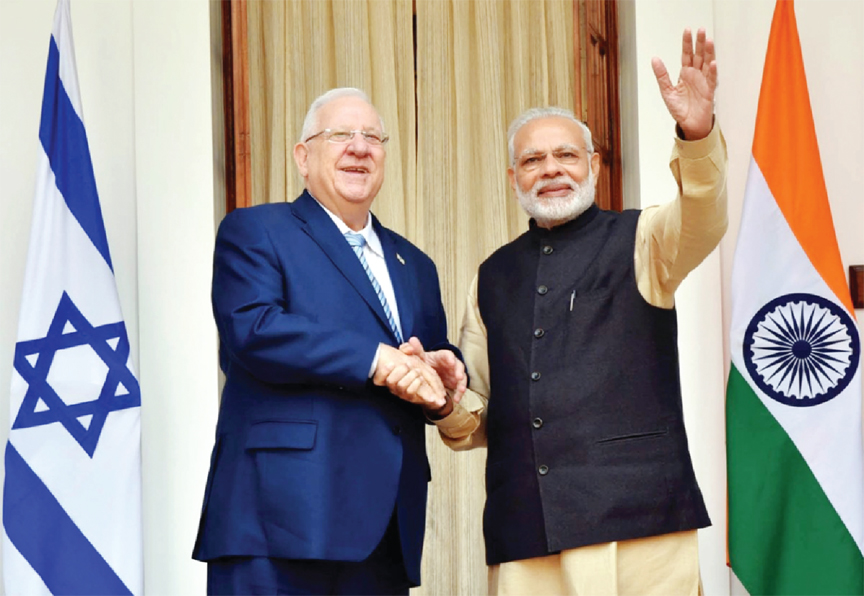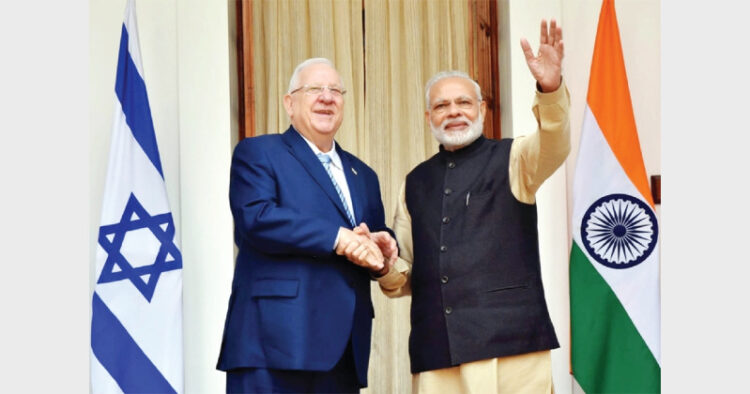 People-to-people contacts buttressed by history and tourist linkages among other factors, further bind the India-Israel relationship together. The India-Israel strategic embrace, therefore, would continue to tighten into the foreseeable future
People-to-people contacts buttressed by history and tourist linkages among other factors, further bind the India-Israel relationship together. The India-Israel strategic embrace, therefore, would continue to tighten into the foreseeable future
S Samuel C Rajiv
India-Israel ties gained a new momentum with the visit of President Reuven Rivlin from November 14-21, 2016. The Israeli President’s visit follows the highly
successful visit of President Pranab Mukherjee to Israel and Palestine in October 2015. The previous visit of an Israeli President to India was way back in 1997. In the aftermath Prime Minister Narendra Modi of coming to power in 2014, high level interactions between India and Israel have been on the upswing.
PM Modi and Israeli Prime Minister Benjamin Netanyahu met on the sidelines of the UN General Assembly in September 2014 as well as at the sidelines of the Paris Climate Summit in December 2015. Modi met Rivlin in March 2015 in Singapore, when both the leaders were attending Lee Kwan Yew’s funeral service. Senior Indian Cabinet Ministers who visited Israel in the recent past have included Agriculture Minister Radha Mohan Singh in September 2016, External Affairs Minister (EAM) Sushma Swaraj in January 2016 and Home Minister Rajnath Singh in November 2014. From the Israeli side, former Defence Minister Moshe Yaalon visited India in February 2015.
These high-level political visits have helped further strengthen ties between the two countries. The lack of
high-level political interactions was an issue especially bothering the Israeli side, given the significant role Israel was playing in meeting India’s
developmental and security needs. When former EAM S M Krishna visited Israel in January 2012 for instance – on the occasion of the 20th anniversary of establishment of bilateral ties, then Foreign Minister (and current Defence Minister) Avigdor Lieberman hoped that such high-level political visits would be more frequent.
India, though, has not yet reciprocated the visit of Prime Minister Ariel Sharon in September 2003. Despite the robust defence ties, it is jarring to note that there has been no Defence Ministerial visit to Israel as yet. Both the countries are gearing up to celebrate the 25th
anniversary of the establishment of diplomatic ties in January 2017. The expected visit of Prime Minister Modi to Israel in 2017 – which could also possibly be preceded by the visit of Netanyahu to India, would further cement the burgeoning partnership.
President Rivlin’s Indian interactions showcase the range and breadth of the India-Israel relationship. Israel was the ‘Partner’ country at the 12th CII Agrotech exhibition in Chandigarh (Canada and Germany being the ‘Focus’ countries), which was inaugurated jointly by Rivlin and President Mukherjee. Rivlin visited the India-Israel Centre for Excellence in Karnal, Haryana, established as part of the India-Israel Agricultural Work Plan (IIAP). The IIAP was first established in 2006, with the aim to promote crop diversity, productivity and resource use efficiency. It has since been renewed and expanded with Israeli know-how and professional training programmes tailored to cater to India’s growing requirements for better technologies to improve its food security. It is pertinent to note that Agriculture Minister Mohan Singh had a meeting with over 30 Indian post-doctoral students studying at the Israeli Agricultural research Organisation, the country’s premier centre for agricultural research, during his September 2016 visit.
A MoU on water resources management was amongst the agreements signed during Rivlin’s visit. Rivlin visited a water treatment plant in Agra, being run with Israeli expertise. India-Israel cooperation in the education sector is set to witness a quantum growth with, MoUs signed between both the countries institutes of higher learning in the presence of Union HRD Minister Prakash Javadekar.
While in Mumbai, President Rivlin participated in a commemoration ceremony at the Chabad House, which was witness to the traumatic events of November 26, 2008. Israeli citizens were among the numerous others who lost their lives in the carnage planned and executed from Pakistan. Prime Minister Modi and President Rivlin in joint remarks made on November 16 agreed to ‘intensify’
cooperation ‘to combat the forces of extremism and radicalisation that threaten all peace-loving nations’, with Modi specifically refering to Pakistan, when he noted that ‘one of the countries of the origin and spreading terrorism and extremism was in India’s neighbourhood.
India and Israel have the necessary institutional framework to expand cooperation on homeland security (HLS), with an agreement on HLS cooperation being signed in February 2014, prior to Modi assuming office. Home Minister Rajnath Singh’s visit to Israel in November 2014 further built on this framework, which is being strengthened now. Border security would be an important component of such cooperation, with India looking for appropriate technologies to further secure the vulnerable portions of its borders. Apart from such technologies, getting to better know Israeli best practices and their applicability to the Indian context to strengthen institutional mechanisms would continue to drive Indian interests. The primary Israeli aim in expanding counter-terror cooperation no doubt would be to prevent any untoward incidents targeting its citizens, who visit India in large numbers after the completion of their compulsory military service.
Defence cooperation between the two countries, the dominant peg of the relationship, is progressing apace, with Israel keen to partner India in meeting its security needs. Indian counter- insurgency forces in Kashmir for instance face down their enemies armed with Israeli Tavor assault rifles and Galil sniper rifles. Israeli radars and anti-missile defence systems like the Barak protect frontline Indian warships. The agreement for three Phalcon airborne early warning and control (AEW&C) aircraft was one of the biggest equipment deals between the two countries in March 2004 valued at more than $1 billion. Surface-to-air
missiles (SAM) for the Indian Air Force and the Indian Navy are in advanced stages of joint development.
Some of the major defence deals entered into by the Modi Government include the decision to acquire two
additional Phalcon aircraft in March 2016 as well as the October 2014 decision to buy Israeli Spike anti-tank guided missiles (ATGM’s). Prime Minister Modi in joint remarks with Rivlin indicated that both the countries have decided to ‘broad-base’ their defence cooperation through ‘production and manufacturing partnerships’. Cyber security has been flagged as another expanding arena of cooperation in the security sphere.
Israel views its burgeoning relationship with India as evidence of the success of its diplomacy, which constantly has to grapple with international scrutiny on account of its Palestine policy as well as such elements as the boycott, divestment and sanctions (BDS) campaign directed against its products and educational
institutions. Apart from India, the other key states that Israel engages actively with in Asia include China, Japan and Vietnam. The Israel-China relationship is witnessing rapid growth – with a focus on the ‘Innovation economy’ and rising Chinese investments in Israeli infrastructure projects and high-tech educational institutions. Israel is restrained from sharing strategic defence technologies with Beijing however, as it would be against the interests of its closest ally the United States as well as due to the continuing allure of the Indian market. India is probably the most important ‘strategic’ partner for Israel (after the United States), given its export dependent arms industry. People-to-people contacts buttressed by history and tourist linkages, among other factors further bind the relationship together. The India-Israel strategic embrace therefore would continue to tighten into the foreseeable future, given mutual complementarities and interests.
The writer is Associate Fellow at the Institute for Defence Studies and Analyses (IDSA), New Delhi.














Comments